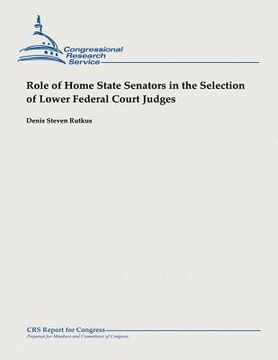Role of Home State Senators in the Selection of Lower Federal Court Judges (en Inglés)
Reseña del libro "Role of Home State Senators in the Selection of Lower Federal Court Judges (en Inglés)"
This report examines the role that home state Senators, historically and in the contemporary era, have played in the selection of nominees to U.S. district court and circuit court of appeals judgeships. It also identifies issues that have arisen in recent years over the role of home state Senators in the selection process for federal judges. Report findings include the following: Supported by the custom of "senatorial courtesy," Senators of the President's party have long played, as a general rule, the primary role in selecting candidates for the President to nominate to district court judgeships in their states. They also have played an influential, if not primary, role in recommending candidates for circuit court judgeships associated with their states. For Senators who are not of the President's party, a consultative role, with the opportunity to convey to the President their views about candidates under consideration for judgeships in their states, also has been a long-standing practice-and one supported by the "blue slip" procedure of the Senate Judiciary Committee; In recent and many past Congresses, the Judiciary Committee's blue slip procedure has reinforced Senators' influence over judicial nominations in their state by permitting nominations to receive committee action only when both home state Senators have returned "positive" blue slips; Senators, in general, exert less influence over the selection of circuit court nominees than they do over district court nominee selection. Whereas home state Senators of the President's party often dictate whom the President nominates to district judgeships, their recommendations for circuit nominees, by contrast, typically compete with names suggested to the Administration by other sources or generated by the Administration on its own; Whether and how a state's two Senators share in the judicial selection role may depend, to a great extent, on their respective prerogatives, party affiliations, and interests. Senators have great discretion as to the procedures they will use to identify and evaluate judicial candidates, ranging from informally conducting candidate searches on their own to relying on nominating commissions to evaluate candidates. Contact between a Senator's office and the Administration can be expected to clarify the nature of the Senator's recommending role, including the degree to which the Administration, in its judicial candidate search, will rely on the Senator's recommendations; If a President selects a district or circuit court nominee against the advice of, or without consulting, a home state Senator, the latter must decide whether to oppose the nomination (either first in the Senate Judiciary Committee or later on the Senate floor). In recent years, the role of home state Senators in recommending judicial candidates has given rise to various issues, including the following: What constitutes "good faith" or "serious" consultation by the Administration? Should home state Senators always have the opportunity to provide their opinion of a judicial candidate before he or she is nominated?; How differently should the Administration treat the input of Senators, depending on their party affiliation?; What prerogatives should home state Senators have in the selection of circuit court nominees?; Should the policy of the Judiciary Committee allow a home state Senator to block committee consideration of a judicial nominee? Conversely, should the Judiciary Committee and the Senate, as matter of courtesy, approve judicial nominees supported by home state Senators?; Should home state Senators use commissions to aid them in selecting judicial candidates to recommend to the President?

